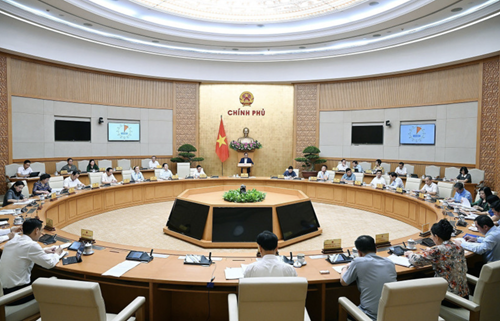Addressing a meeting to review two months of implementing the two-tier local government model, PM Pham Minh Chinh described the restructuring of administrative units as a “revolution” in organization aimed at creating momentum for a new era of prosperity.
    |
 |
|
Prime Minister Pham Minh Chinh chairs a meeting of the Government Party Committee’s Standing Board and the Government on August 23 to review two months of implementing the two-tier local government model. |
According to the Ministry of Home Affairs, to date, localities have completed the restructuring of provincial and communal-level People’s Councils and People's Committees, establishing 465 specialized agencies under 34 provincial-level People’s Committees and 9,916 offices under 3,321 commune-level committees.
Public service centers have been set up in 32 localities, handling 4.4 million dossiers from July 1 to August 19, nearly 75% submitted online.
As of August 21, 2025, based on 30 Government decrees on decentralization and delegation of authority, ministries and ministerial-level agencies had issued 66 circulars to further detail and guide state management responsibilities under the two-tier local government model.
Personnel downsizing has seen more than 94,000 officials leave their posts, with over 50,000 already receiving payments.
The Ministry of Finance reported 16,124 surplus properties requiring handling, including 6,704 arising from restructuring.
PM Pham Minh Chinh said that the reform has gained wide consensus under the leadership of Party General Secretary To Lam and the Politburo. The model, he noted, has proved stable and effective in clearing obstacles, meeting public expectations.
He admitted difficulties are inevitable and instructed authorities at all levels to promptly resolve emerging issues, especially at the grassroots level.
Legal frameworks must be further refined, staffing adjusted to meet real demand, and outstanding compensation and retirement payments must be completed no later than August 30. Facilities must be used efficiently, avoiding waste but ensuring no shortages, he emphasized.
He urged ministries to strengthen financial and budgetary support, invest in IT and digital infrastructure, and create mechanisms to mobilize resources. All systems must be unified, accurate, secure and interoperable, with tools soon developed to measure performance across administrations. The 17 ministries and agencies handling administrative procedures must also ensure full connectivity, he directed.
He instructed Deputy PMs, ministers, heads of agencies and localities to proactively resolve issues within their authority and promptly report those beyond their mandate. Training and guidance should be strengthened to help grassroots officials adapt quickly to their new tasks.
The PM also emphasized the role of media in disseminating policies, highlighting effective models and innovations, while pointing out challenges and proposing solutions. He called for stronger inspection, timely commendation of excellent units, and strict handling of those deliberately obstructing progress.
Finally, he directed preparations for the upcoming national conference to review the emulation movement to eliminate dilapidated houses on August 26, as well as the exhibition highlighting the nation's 80-year journey of independence, freedom and happiness on August 28.
Source: VNA